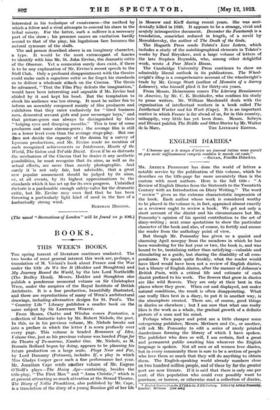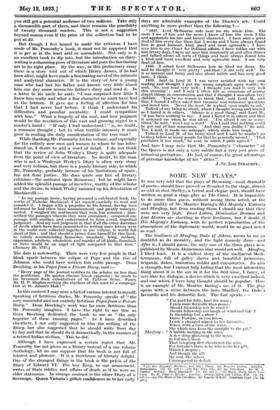ENGLISH DIARIES.*
" L'homme qui a le temps d'ecrire un journal intime nous parait tie pas avoir suffisamment compris combien le monde est vaste." —RENAN, Fealties Ditachtes.
MR. ARTHUR PONSONBY has done the world of letters a notable service by the publication of this volume, which he describes on the title-page far more accurately than is the custom with most authors. Here is the full title : " A Review of English Diaries from the Sixteenth to the Twentieth Century with an Introduction on Diary Writing." The word " review " gives us the extreme characteristic impression of the book. Each author whose work is considered worthy to be placed in the volume is, in fact, appraised almost exactly as a reviewer ought to review a book. We get not only a short account of the diarist and his circumstances but Mr. Ponsonby's opinion of his special contribution to the art of diary-writing ; next come quotations to show the particular character of the book and also, of course, to fortify and amuse the reader from the anthology point of view.
But though Mr. Ponsonby has given us a quaint and charming April nosegay from the meadows in which he has been wandering for the last year or two, the book is, and was bound to be, tantalizing rather than satisfying—valuable and stimulating as a guide, but sharing the disability of all com- pendiums. To speak' quite frankly, what the reader would have liked would have been not a review of English diaries, but a library of English diaries, after the manner of Johnson's British Poets, with a critical life and estimate of each diarist prefixed to his work. The flowers that grow in diaries are like wild flowers. They are only at their best in the places where they grow. When cut and displayed, not under natural conditions, the result is often disappointing. What one really likes best in a diary, to put it in another way, is the atmosphere created. There are, of course, good things in diaries as elsewhere ; but I am sure that what one really likes is the work as a whole, the gradual growth of a definite picture of a man and his mind.
Perhaps when paper and print are a little cheaper some enterprising publisher, Messrs. Methuen and Co., or another, will ask Mr. Ponsonby to edit a ,series of nicely printed duodecimos forming the library of which I have spoken. The publisher who does so will, I am certain, find a great and permanent public awaiting him wherever the English language is spoken. Not all men or all women love diaries, but in every community there is sure to be a section of people who love them so much that they will do anything to obtain them. The English-speaking world already numbers close on two hundred million people, and of these by far the greater part are now literate. If it is said that there is only one per cent. of this population who could ever possibly want to purchase, or borrow, or otherwise read a collection of diaries, • English Diaries from the %Mato the d Xth Century. Edited by Aleut Ponnonby, London : Methuen [2ket nen.] • you still get a potential audience of two millions. Take only a thousandth part of them, and there remains the possibility of twenty thousand readers. This is not a suggestion beyond reason even if the price of the collection had to be put at £2.
But though I feel bound to make the criticism I have made of Mr. Ponsonby's book, it must not be supposed that it is per se in the least arid or unreadable. Not only is it an excellent book to dip into, but the introduction on diary- writing is a charming piece of literature and puts the fascinating art in its right place. By the way, in this preliminary essay there is a story told out of which Henry James, if he had been alive, might-have made a fascinating novel of the intimate and analytical character. It is the story of how a young man who had lost his father and known very little about him one day came across his father's diary and read it. In a letter to his uncle he said : "I was surprised how little I knew him really and what a fine character he must have had at the bottom. It gave me a feeling of affection for him that I had never had before. I think I understand his difficulties and peculiar mentality. I could sympathize with him." What a tragedy of the soul, and how poignant would be the revelation of this vast and growing regret in a master's hand " If only I had understood ! " is, no doubt, a common thought ; but to what terrible intensity it must grow in reading the daily manifestation of the true man !
While thanking Mr. Ponsonby for his volume, and especially for the entirely new men and women to whom he has intro- duced us, I desire to add a word of detail. I do not think that the review of John Wesley's Diary is quite adequate from the point of view of literature. No doubt, to the man who is not a Wesleyan Wesley's Diary is often very stony and very tedious, but there is a purely literary side, to which Mr. Ponsonby, probably because of his limitations of space, has not done justice. He does quote one line of literary criticism—the outburst upon Rousseau ; but he might have added the splendid passage of invective, worthy of the scholar and the divine, in which Wesley summed up his detestation of Machiavelli :—
" In my passage home, having procured a celebrated book, the works of Nicholas Machiavel, I set myself carefully to read and consider it. I began with a prejudice in his favour, having been informed he had often been misunderstood, and greatly misrepre- sented. I weighed the sentiments that were less common ; tran- scribed the passages wherein they were contained ; compared one passage with another, and endeavoured to form a cool, impartial judgment. And my cool judgment is, that Hall the other doctrines of devils which have been committed to writing since letters were in the world were collected together in one volume, it would fall short of this : and that should a prince form himself by this book, so calmly recommending hypocrisy, treachery, lying, robbery, oppression, adultery, whoredom, and murder of all kinds, Domitian or Nero would be an angel of light compared to that man." (January 26, 1737.)
The date is noteworthy. There were very few people in that bleak epoch between the eclipse of Pope and the rise of Johnson who could have written this noble passage. Dean Beeching, in his Pages from a Private Diary, said :—
" Every page of the journal testifies to the scholar no less than the gentleman. He quotes obscure Greek epigrams ; he reads to his Savannah flock exhortations of St. Ephrem Syrus. Fancy Mr. H. P. Hughes reciting the rhythms of this saint to a congrega- tion at St. James's Hall ! "
In this context I may note a fact of curious interest to myself. Speaking of fictitious diaries, Mr. Ponsonby speaks of " the very successful and not entirely fictitious Pages from a Private Diary." Dean Beeching's work was far more fictitious than Mr. Ponsonby imagines. I have the right to say this as Dean Beeching dedicated the book to me as " the only begetter of these ensuing pages." As I have described elsewhere, I not only suggested to him the writing of the Diary, but also suggested that he should write from day to day and that he should do it dramatically, in the manner of a retired Indian civilian. This he did.
Although I have expressed a certain regret that Mr. Ponsonby has not given us a library instead of a one volume Anthology, let no one suppose that his book is not full of interest and pleasure. It is a storehouse of literary delight. One of the strangest things in the book is the précis of the Diary of Edward VI. The boy King, to our amazement, writes of State riddles and affairs of death as if he were an elder statesman. In strange contrast is the other Diary of a Sovereign. Queen Victoria's girlish confidences as to her early
days are admirable examples of the Diarist's art. Could anything be more perfect than the following 7-
" 1837. Lord Melbourne rode near me the whole time. The more I see of him and the more I know of him the more I like and appreciate his fine and honest character. I have seen a great deal of him every day these last 5 weeks and I have always found him in good humour, kind, good and most agreeable : I have seen him in my Closet for Political affairs, I have ridden out with him (every day.), I have sat near him constantly at and after dinner and talked about all sorts of things and have always found hint a kind and most excellent and very agreeable man. I am very fond of him.
1838. I asked Lord Melbourne how he liked my dress. He said he thought it ` very pretty ' and that it did very well.' He is so natural and funny and nice about toilette and has very good taste, I think.
1889. Said to Lord M. I was never satisfied with my own reading and thought I put the wrong emphasis upon words ; he said, `No, you read very well ; I thought you read it very well this morning ' ; and I said I often felt so conscious of saying stupid things in conversation and that I thought I was often very You've no reason to think that,' said Lord M., and that I feared I often asked him tiresome and indiscreet questions and bored him. 'Never the least,' he replied, 'you ought to ask.'
Talked of my being so silent, which I thought wrong and uncivil as I hated it in others. Silence is a good thing,' said Lord M.,
if you have nothing to say.' I said I hated it in others and that it annoyed me when he was silent. I'm afraid I am so some- times,' he said, won't say a word.' Yes I said that nothing could be got out of him sometimes. And that you dislike ? ' he said. Yes, I said, it made me unhappy, which made him laugh.
Talked to Lord M. of his being tired and I said he mustn't go to sleep before so many people for that he generally snored ! That proclaims it too much,' he said, in which I quite agreed."
And here I may note that Mr. Ponsonby's " character " of the Queen is not only a very subtle but a very just piece of historical portraiture. He had, of course, the great advantage of personal knowledge of his " sitter."
J. ST. LOE STRACHEY.



















































 Previous page
Previous page